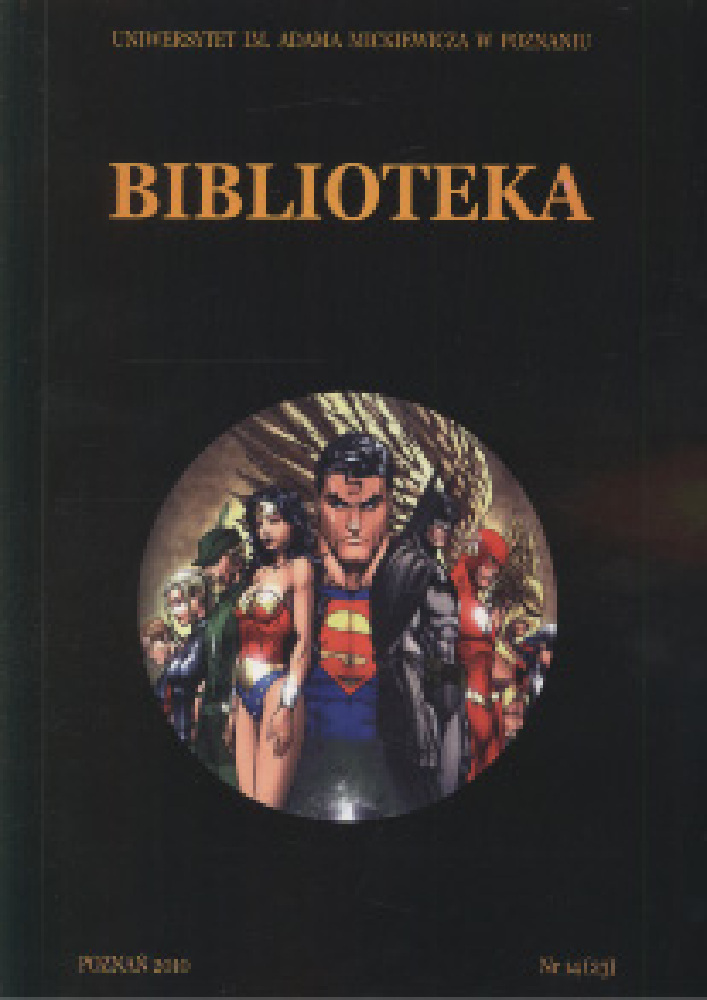Abstract
Since mid-17th century, the scholarly journal was the most important medium of communication within the community of scholars. It also has a number of other functions, such as quality control, archiving, and recognition of authors. The necessity of journals for the development of science and scholarship has been questioned, also from the perspective of cultural anthropology. Some of its functions can already be replaced with other solutions, made available by new information and communication technologies. A number of proposals for a new formula of the journal do not, however, ensure proper fulfilment of all its traditional functions. It seems both important and interesting to look at the scholarly procedures related to publishing in journals as a ritual strengthening self-identification and integration of a scholarly subcommunity related to a particular research area and methodological school.References
Brann N.L., The Abbot Trithemius (1462-1516): the renaissance of monastic humanism, Leiden 1981 (Studies in the history of Christian thought, 24).
Bush V., As We May Think, „The Atlantic Monthly” 1945, nr 176 [online], [dostęp:20.02.2010], dostępny w Internecie: http://www.theatlantic.com/doc/194507/bush.
Clarke M., Why Hasn’t Scientific Publishing Been Disrupted Already?, „The Scholarly Kitchen” 2010 [online], [dostęp: 20.02.2010], dostępny w Internecie: http://scholarlykitchen.sspnet.org/2010/01/04/why-hasnt-scientific-publishing-been-disrupted-already.
Feyerabend P., Przeciw metodzie, przeł. S. Wiertlewski, Wrocław 1996.
Jeszke J., Mity polskiej historiografii nauki, Warszawa 2007.
Lindberg D.C., The beginnings of western science: the European scientific tradition in philosophical, religious, and institutional context, prehistory to A.D. 1450, wyd. 2 zmien., Chicago 2007.
Morton B., Is the Journal as We Know It an Article of Faith? An Open Letter to the Faculty, „The Public-Access Computer Systems Review” 8, 1997, nr 2 [online], [dostęp: 20.02.2010], dostępny w Internecie: http://epress.lib.uh.edu/pr/v8/n2/mort8n2.html.
Nahotko M., Naukowe czasopisma elektroniczne, Warszawa 2007.
Nowak P., „Samopublikowanie”: stara metoda – nowy sens w dobie e-science, „Biblioteka” 13 (22), 2009.
Nowak P., Wybrane problemy efektywności polskich czasopism naukowych z dziedziny humanistyki, Poznań 2000.
PLoS ONE, http://www.plosone.org [dostęp: 20.02.2010].
Prinke R.T., „Kwaśne pliki”. Standardy dygitalizacji i problem długowieczności zasobów cyfrowych, w: Dygitalizacja zbiorów bibliotecznych, red. E. Stefańczyk, Warszawa 2006.
Turner V.W., The ritual process. Structure and anti-structure, Chicago 1969.
Wilce J.M., Magical Laments and Anthropological Reflections: The Production and Circulation of Anthropological Text as Ritual Activity, „Current Anthropology” 47, 2006, nr 6.
Wittgenstein L., Uwagi o „Złotej Gałęzi” Frazera, przeł. A. Orzechowski, Warszawa 1998.
License
Copyright (c) 2010 Rafał T. Prinke

This work is licensed under a Creative Commons Attribution-ShareAlike 4.0 International License.
Utwory opublikowane w czasopiśmie Biblioteka, na platformie Pressto należącej do Uniwersytetu im. Adama Mickiewicza w Poznaniu od 2015 roku są udostępniane na
licencji Creative Commons Uznanie autorstwa-Na tych samych warunkach 4.0 Międzynarodowe.
Tym samym wszyscy zainteresowani są uprawnieni do korzystania z utworów opublikowanych po 2015 roku pod następującymi warunkami:
- uznania autorstwa czyli obowiązek podania wraz z rozpowszechnianym utworem informacji o autorstwie, tytule, źródle (odnośniki do oryginalnego utworu, doi) oraz samej licencji
- na tych samych warunkach — remiksując utwór, przetwarzając go lub tworząc na jego podstawie, należy swoje dzieło rozpowszechniać na tej samej licencji, co oryginał.
Uniwersytet im. Adama Mickiewicza w Poznaniu zachowuje prawo do czasopisma jako całości (układ, forma graficzna, tytuł, projekt okładki, logo itp.).
Autor zachowuje prawa majątkowe, ale udziela zgody Uniwersytetowi im. Adama Mickiewicza w Poznaniu na wykorzystanie dzieła. Autorzy tekstów zakwalifikowanych do publikacji proszeni są o wypełnienie podpisanie i przesłanie umowy.
Jeżeli autor artykułu nie jest przekonany, że może wykorzystywać cudze utwory (np. ilustracje, fotografie, tabele) w ramach cytatu we własnej tekście musi dostarczyć do redakcji czasopisma zgodę od uprawnionych podmiotów.
Prawa są zastrzeżone do wszystkich tekstów opublikowanych przed rokiem 2015.





